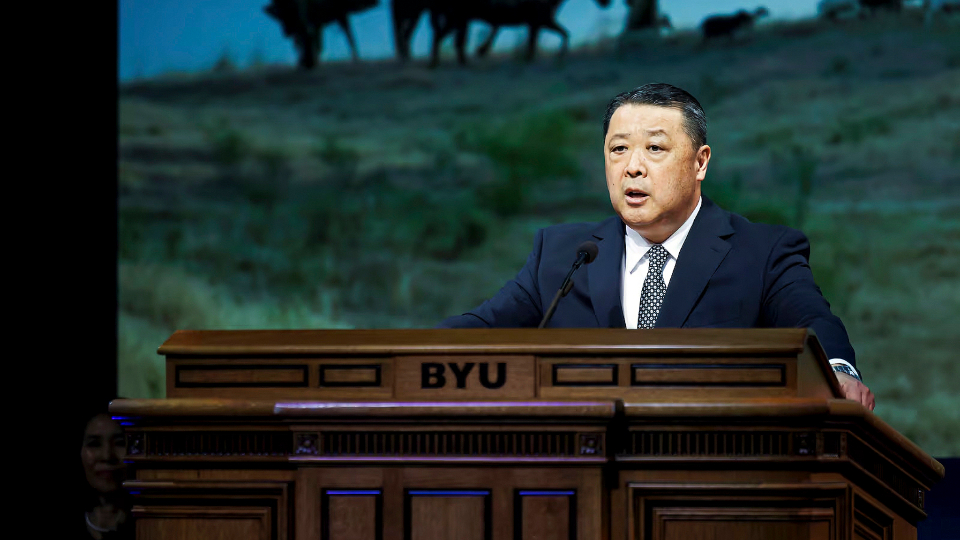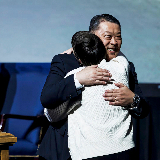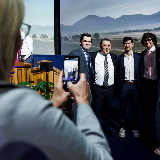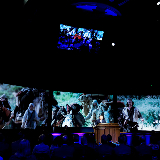| Elder Takashi Wada, a General Authority Seventy, and his wife, Sister Naomi Wada, interact with BYU students after a devotional held in the Marriott Center in Provo, Utah, on Tuesday, October 15, 2024. Photo by Ellie Alder, BYU. | 1 / 10 |
This story appears here courtesy of TheChurchNews.com. It is not for use by other media.
By Joel Randall, Church News
The Book of Mormon is “an inspired textbook for life,” said Elder Takashi Wada, a General Authority Seventy. It’s a guide to coming to know Jesus Christ and acquire His attributes.
“The Book of Mormon has become my compass to help me navigate through the ups and downs of my life,” said Elder Wada in an October 15 BYU devotional at the Marriott Center in Provo, Utah.
Nephi’s journey through the wilderness in 1 Nephi, for instance, can guide students as they navigate life challenges. “As you search diligently,” said Elder Wada, “you will feel the power of the Holy Ghost and recognize the principles Nephi shared with us are time tested and true no matter where or when you live.”
Elder Wada highlighted aspects of Nephi’s journey to illustrate how his trials brought him closer to the Savior in testimony and behavior — and how today’s Saints can similarly become Christike and develop charity.
How Nephi Came to Know Christ

Wada-BYU
Elder Takashi Wada, a General Authority Seventy, speaks at a BYU devotional held in the Marriott Center in Provo, Utah, on Tuesday, October 15, 2024. Photo by Ellie Alder, BYU.To avoid the coming destruction of Jerusalem, Nephi’s family left the city and departed into the wilderness (see 1 Nephi 2:2). “What is your Jerusalem? What would you need to leave behind?” asked Elder Wada. For him, it meant stepping away from past family and faith traditions to join The Church of Jesus Christ of Latter-day Saints as a teenager.
“Following the Savior by being baptized became my application of leaving my own Jerusalem and becoming ‘a new creature’ in Christ (2 Corinthians 5:17). Even though my parents did not like the choice I made at that time, over time they supported my decision to follow the Savior.”
After leaving Jerusalem, Nephi, “having great desires to know of the mysteries of God, ... did cry unto the Lord.” In response, “he did visit me, and did soften my heart that I did believe all the words which had been spoken by my father” (1 Nephi 2:16).
Nephi also sought the Lord by desiring to know the things his father, Lehi, saw in his vision of the tree of life. The Spirit asked Nephi if he believed the vision Lehi had spoken about, and Nephi responded, “I believe all the words of my father” (1 Nephi 11:5).
Yet, when the Spirit asked in verse 16, “Knowest thou the condescension of God?,” Nephi admitted, “I do not know the meaning of all things” (verse 17).
Said Elder Wada, “You can have faith and peace of mind that one day there will be answers to all your questions, even if you may not understand them now.”

Wada-BYU
BYU students listen to Elder Takashi Wada, a General Authority Seventy, speak at a devotional held in the Marriott Center in Provo, Utah, on Tuesday, October 15, 2024. Photo by Ellie Alder, BYU.How Nephi’s Trials Helped Him Develop Charity
Elder Wada shared that “the blessings associated with the trials in our lives are to become closer to the Lord and to develop the characteristics of charity, even the pure love of Christ.” Such was the case with Nephi, who despite difficulties received and acted on character-refining guidance from the Spirit.
“He never let go of what he gained spiritually, and he remained true to the faith which his father, Lehi, cherished,” said Elder Wada.
When Nephi and his brothers returned to Jerusalem to obtain the plates of brass, “Nephi’s family learned the critical elements of charity: being long-suffering, seeking the will of the Lord rather than their own and bearing all things they received along the way.”
Nephi continued to develop charity as his family traveled through the wilderness. “Their ability to bear their wilderness journey without murmuring is a great example of overcoming pride by being a disciple who is ‘not puffed up,’ ‘thinketh no evil’ and ‘envieth not’ (1 Corinthians 13:4-5).”
Nephi didn’t succumb to opposition, said Elder Wada. “Even when his brothers would not support him and bound him with cords, Nephi continued in his love for them.” Despite swelling and soreness from the cords, he “did not murmur against the Lord because of [his] afflictions” (1 Nephi 18:16).
Elder Wada said that through his endurance, Nephi learned to become kind and not be easily provoked, attributes of charity (see 1 Corinthians 13:4-5). In faith and patience, “he completely trusted that the Lord would lead him to the promised land.” And He did.
“When you receive all things with gratefulness as Nephi did,” said Elder Wada, “you can truly understand the will of God, even in your trials, and believe that all things will be made glorious.”
Copyright 2023 Deseret News Publishing Company.












